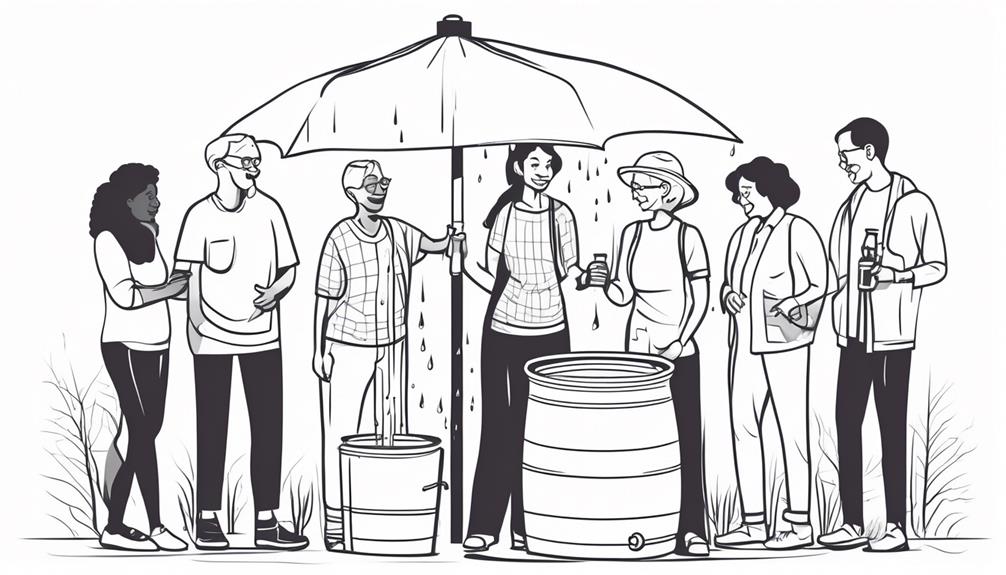Do you know that by 2050, a significant increase in urban populations facing water scarcity is projected globally? Imagine the impact this could have on cities already struggling to meet water demands.
Now, picture a world where innovative solutions are being explored to combat urban water scarcity. From groundwater exploitation to advanced desalination techniques, these strategies hold the key to securing a sustainable water future for our urban landscapes.
But how effective are these solutions, and what can individuals and communities do to contribute to this crucial cause? Let's explore the intricate web of challenges and opportunities in the realm of urban water scarcity together.
Key Takeaways
- Sustainable water management is crucial to address urban water scarcity.
- Infrastructure upgrades such as smart water management technologies are essential.
- Innovative solutions like rainwater harvesting and wastewater recycling can help reduce water scarcity.
- Community engagement, policy measures, and efficient resource utilization are vital for effective urban water management.
Current Urban Water Scarcity Status
Urban water scarcity currently impacts a staggering 900 million people worldwide, a number projected to surpass 2 billion by 2050. As global population growth continues, sustainable water management becomes increasingly crucial in addressing water shortages and water stress in urban areas. The challenge of providing clean and accessible water to a growing number of city dwellers is daunting. With factors like pollution, overuse, climate change, and increased demand exacerbating the issue, the need for effective solutions is urgent.
In the face of these challenges, innovative approaches such as groundwater exploitation, desalination, and water storage are being explored. To tackle the escalating urban water scarcity crisis, new strategies like domestic virtual water trade, inter-basin water transfer, and groundwater exploitation are being considered, especially for large cities. These solutions aim to ensure that urban areas have a reliable and sustainable water supply to meet the needs of their expanding populations while safeguarding human health, socio-economic development, and the environment.
Projections for Urban Water Scarcity
You're about to explore the future of urban water scarcity, where the demand for water is expected to soar.
Major cities will need significant upgrades to their infrastructure to meet this growing need.
Embracing sustainable water usage practices will be crucial in ensuring a water-secure future for urban areas.
Future Water Demand
Considering the impending rise in water demand, projections for urban water scarcity point towards a significant challenge for the future. With climate change exacerbating water scarcity issues, implementing smart irrigation systems and promoting sustainable development are crucial steps in reducing water scarcity.
The increasing urban population, especially in regions like India, highlights the urgent need for effective water conservation methods. To address future water demand, innovative solutions such as groundwater exploitation, desalination, and inter-basin water transfer are being proposed.
Infrastructure Upgrades Needed
Infrastructure upgrades play a pivotal role in addressing the projected urban water scarcity challenges ahead. To combat this issue effectively, consider the following:
- Investing in Water Supply Systems: Upgrading and expanding water supply infrastructure can help meet the increasing demand for water in urban areas.
- Implementing Smart Water Management Technologies: Utilizing advanced technologies can enhance water efficiency, reduce wastage, and optimize water usage in cities.
- Upgrading Wastewater Treatment Facilities: Enhancing wastewater treatment plants can't only improve water quality but also recycle and reuse water, contributing to sustainable water management practices.
Sustainable Usage Practices
To combat urban water scarcity effectively, embracing sustainable usage practices like rainwater harvesting and wastewater recycling is pivotal. These innovative water solutions not only reduce water scarcity but also ensure a sustainable future for urban areas.
Implementing smart irrigation systems and adopting groundwater recharge methods are essential steps in preserving access to water. Additionally, solar desalination and pollution control measures play a significant role in regulating water usage and maintaining safe water resources in cities.
Groundwater exploitation, reservoir construction, and inter-basin water transfer are potential solutions that can address the challenges faced by large urban centers. By integrating these sustainable practices into urban planning, we can work towards a more water-secure and resilient future for all.
Factors Influencing Water Scarcity
Hey there! Let's talk about what's causing water scarcity in urban areas.
Climate change, population growth, over-extraction of groundwater, and pollution are all playing a role in this issue.
Unequal distribution, increased demand, and economic limitations further compound the scarcity challenge.
Causes of Scarcity
Pollution, overuse, climate change, population growth, and mismanagement all play crucial roles in influencing urban water scarcity.
- Pollution: Agricultural runoff and industrial waste impact water quality, intensifying scarcity.
- Overuse: Excessive water consumption in agriculture, industry, and households strains resources, worsening scarcity.
- Climate Change: Melting glaciers and increased droughts due to climate change exacerbate water shortages.
These factors collectively contribute to the challenge of urban water scarcity worldwide.
Addressing these issues through sustainable water management practices, efficient resource allocation, and conservation efforts is essential for ensuring a reliable water supply for urban populations while safeguarding water quality for future generations.
Impact on Society
Amidst the challenges posed by pollution, overuse, and climate change in exacerbating urban water scarcity, the impact on society looms large with reduced access to safe drinking water and sanitation facilities. This scarcity not only affects water consumption but also hampers efforts to address water scarcity effectively.
As urban populations grow, the strain on water resources intensifies, impacting socioeconomic development. The projected increase in water-scarce urban populations globally will significantly burden cities and citizens, with countries like India facing substantial growth in water-scarce urban populations.
With nearly half of the world's large cities expected to be in water-scarce regions by 2050, the societal implications are profound, potentially leading to conflicts over limited water resources. It's crucial to implement effective solutions to mitigate these challenges and ensure sustainable access to clean water for all.
Innovative Solutions for Water Crisis

To combat urban water scarcity, embracing innovative solutions is crucial for sustainable water management. By reducing water wastage and implementing cutting-edge technologies, we can work towards alleviating the global water scarcity crisis.
Here are three innovative solutions that hold promise in addressing the water crisis:
- Solar Impulse Label: This recognition platform plays a vital role in promoting innovative solutions that tackle water scarcity. Companies can showcase their advancements in water conservation to contribute to global efforts in sustainable water management.
- Clean Water Technologies: Emphasizing the adoption of clean water technologies is essential for efficient water usage. By integrating advanced filtration systems and water purification methods, we can optimize water resources and minimize wastage.
- Drip Irrigation Systems: Drip irrigation offers a precise and water-efficient method for agricultural practices. By delivering water directly to the roots of plants, this technology minimizes water loss through evaporation and runoff, making it a valuable tool in combating the water crisis.
Implementing Sustainable Water Practices
Embrace sustainable water practices by incorporating innovative solutions like solar desalination and smart irrigation systems to effectively manage water resources and combat urban water scarcity. These methods not only regulate water usage but also promote conservation and efficiency.
Rainwater harvesting and wastewater recycling are key strategies in reducing water scarcity and encouraging sustainable water usage. Additionally, implementing groundwater recharge methods is crucial for preventing water shortages and sustaining water resources in urban areas.
To maintain safe and sustainable water sources, pollution control measures and improved sewage treatment are essential. Monitoring water quality regularly is also vital in ensuring the longevity of these resources.
Community Engagement for Water Conservation

Engaging local communities through educational programs fosters awareness and promotes behavioral changes for water conservation. By actively involving residents in the preservation of available water resources, effective solutions can be implemented to combat urban water scarcity.
Here are three key strategies for successful community engagement in water conservation:
- Tailored Initiatives: Collaborate with community leaders and organizations to develop water-saving initiatives that address the specific needs and challenges of the area. By customizing conservation efforts to suit the local context, residents are more likely to participate and adopt sustainable practices.
- Interactive Events: Host community events, workshops, and outreach programs to engage residents in water conservation efforts. These interactive platforms not only educate individuals on the importance of water conservation but also encourage active participation and involvement in initiatives.
- Utilizing Technology: Harness the power of social media platforms and community networks to disseminate information, share water-saving tips, and foster a sense of collective responsibility for water conservation. By utilizing technology, a wider audience can be reached, and awareness can be raised effectively.
Policy Measures for Urban Water Management
By actively involving local communities in water conservation efforts, the focus now shifts towards implementing robust policy measures for sustainable urban water management. Effective water systems help combat urban water scarcity. The United Nations emphasizes the need for policy measures that promote efficient water management.
Incorporating innovative solutions like solar desalination and smart irrigation systems can regulate water usage, contributing to conservation efforts. Prioritizing groundwater recharge methods and rainwater harvesting in policy measures is essential for enhancing water sustainability in urban areas.
Pollution control and improved sewage treatment should be integral parts of urban water management policies to ensure water quality. By implementing these comprehensive policy measures, cities can address the challenges of water scarcity and work towards creating a more resilient and sustainable water future for urban communities.
Frequently Asked Questions
What Are Some Solutions That Can Help With Water Scarcity?
You can combat water scarcity by embracing sustainable practices like rainwater harvesting, wastewater recycling, and groundwater recharge. Implement solar desalination, smart irrigation, pollution control, and improved sewage treatment to ensure a steady and safe water supply.
What Is the Solution to the Water Scarcity in Egypt?
To solve water scarcity in Egypt, you need to embrace sustainable practices like solar desalination and smart irrigation. Rainwater harvesting and wastewater recycling are key. Recharge groundwater and control pollution. These steps ensure ample water for urban areas.
What Is the Water Scarce Cities Initiative?
You want to know about the Water Scarce Cities Initiative. It's all about tackling urban water scarcity with innovative solutions. By promoting smart water management and tech, it aims to quench cities' thirst sustainably.
What Is the Problem With Urban Water?
In cities, water scarcity occurs when demand exceeds supply. Factors like pollution, overuse, and climate change worsen the problem. Solutions like groundwater use and desalination vary in effectiveness. Understanding the causes is crucial for addressing urban water scarcity.
Conclusion
You've uncovered the secret to solving urban water scarcity! With innovative solutions like groundwater exploitation, desalination, and sustainable water practices, cities will thrive like never before.
Get ready for a future where water shortages are a thing of the past, and urban areas are flourishing with abundance. Embrace the power of water conservation and watch as our cities transform into oases of sustainability and growth.
The future is bright, and water scarcity is a problem of the past!
